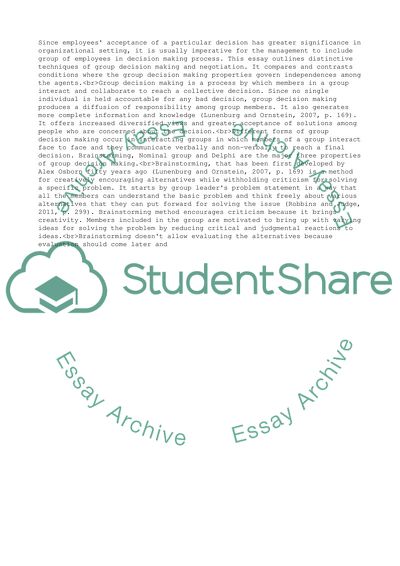Cite this document
(“Outline the distinctive properties of group decision-making and Essay - 1”, n.d.)
Outline the distinctive properties of group decision-making and Essay - 1. Retrieved from https://studentshare.org/management/1601275-outline-the-distinctive-properties-of-group-decision-making-and-negotiation-compare-and-contrast-the-conditions-under-which-these-two-coordination-mechanisms-can-govern-interdependences-among-agents-effectively-and-efficiently
Outline the distinctive properties of group decision-making and Essay - 1. Retrieved from https://studentshare.org/management/1601275-outline-the-distinctive-properties-of-group-decision-making-and-negotiation-compare-and-contrast-the-conditions-under-which-these-two-coordination-mechanisms-can-govern-interdependences-among-agents-effectively-and-efficiently
(Outline the Distinctive Properties of Group Decision-Making and Essay - 1)
Outline the Distinctive Properties of Group Decision-Making and Essay - 1. https://studentshare.org/management/1601275-outline-the-distinctive-properties-of-group-decision-making-and-negotiation-compare-and-contrast-the-conditions-under-which-these-two-coordination-mechanisms-can-govern-interdependences-among-agents-effectively-and-efficiently.
Outline the Distinctive Properties of Group Decision-Making and Essay - 1. https://studentshare.org/management/1601275-outline-the-distinctive-properties-of-group-decision-making-and-negotiation-compare-and-contrast-the-conditions-under-which-these-two-coordination-mechanisms-can-govern-interdependences-among-agents-effectively-and-efficiently.
“Outline the Distinctive Properties of Group Decision-Making and Essay - 1”, n.d. https://studentshare.org/management/1601275-outline-the-distinctive-properties-of-group-decision-making-and-negotiation-compare-and-contrast-the-conditions-under-which-these-two-coordination-mechanisms-can-govern-interdependences-among-agents-effectively-and-efficiently.


